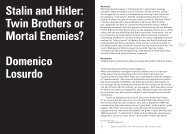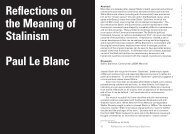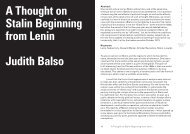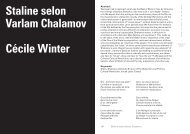adrian
adrian
adrian
- No tags were found...
You also want an ePaper? Increase the reach of your titles
YUMPU automatically turns print PDFs into web optimized ePapers that Google loves.
no longer merely the phenomenal object-as-appearance but, instead, agenuinely objective (as extra/non-subjective) object an sich (i.e., not the“formless lump” of das Ding an sich, 115 but, instead, an asubjective yetformed/unified objectivity). That is to say, Hegel’s immanent critiquesof the two-worlds metaphysics of transcendental idealism, with itsanti-realist subjectivism as embodied in the related theses apropos thestrict ideality of space and time as well as the existence of things-inthemselves,allow for interpretively appropriating the transcendentalunity of apperception of the “Transcendental Deduction” such that thisunity is no longer enclosed within the limits of the merely conscious,mental, and subjective as deontologized, epistemological, andexclusively ideal. This immanent-critical possibility for sublating Kant’sDeduction testifies to the fact that, although Kant himself debatablyrestricts his subject-object identity (or, as per Allison, reciprocity) tothe one side of the subject only, this identity is open to an absoluteidealist speculative re-reading once the anti-realist arguments of thefirst Critique’s Aesthetic and Dialectic are justifiably left by the wayside(with this openness helping to explain what Hegel means when he saysin 1801 that, “It was Reason (Vernunft) itself that baptized this theoryof the intellect”). Thus, the Differenzschrift adds yet more weight tomy prior claims that Pippin misconstrues Hegel’s references to Kant’stranscendental unity of apperception as drawing the former closer to thesubjective idealism of the latter.Given that I began this intervention with the question ofbeginnings in Hegel’s philosophy and Žižek’s perspectives onGerman idealism, how is my problematization of Pippin’s use of thetranscendental unity of apperception to establish a certain continuitybetween Kant and Hegel linked to this point of departure? As earlierremarks by me already indicate, the link is simple and direct: Insofaras Pippin identifies his Kantianized version of “The Doctrine of theConcept” as the genuine logical start of the Hegelian system (bycontrast with those, such as Houlgate, Henrich, and Žižek, who advocatefor “The Doctrine of Being” or “The Doctrine of Essence” as the locusof proper beginning in Hegel’s Logic), my critique of Pippin’s portrayalof Hegel’s relationship to the “Transcendental Deduction” of the firstCritique inhibits the gesture of elevating Kant’s transcendental unity ofapperception to the status of grounding primordial moment of Hegel’sphilosophical edifice as a whole. In fact, I wish to move towards aCRISIS&CRITIQUE#3conclusion with the proposal that the entire debate amongst readers ofHegel about where the Hegelian system well and truly gets underway inthe Logic rests on two questionable assumptions shared by participantsin this debate (and this despite their otherwise fierce disagreementsamongst themselves): First, there is a stable beginning, a fixed statingpoint, to be found somewhere within the Logic; And, second, theLogic itself (or, at least, some moment[s] within it) is the foundational,one-and-only proper beginning of Hegel’s systematic philosophicalapparatus in its entirety.Contra these two assumptions, I assert that: First, the Logic inits full sweep is composed of a series of (spectacular) failed attempts tobegin with thinking alone (with thinking, at the end of this series, drivingitself out of and beyond itself into the Real of the Realphilosophie,first as objectively real spatio-temporal nature in its externality 116 );And, second, there is no single Ur-beginning in Hegel’s philosophy,but, instead, at least three different beginnings incommensurable yetequiprimordial with respect to each other (these two proposals aremore specific versions of suggestions also gestured at by Sedgwick 117 ).Starting with my first assertion here, a snippet from the recentlypublished collection of Žižek’s Jokes is fitting to quote at this juncture:There is the ultimate good news/bad news doctor joke thatreaches the dark limit of a joke; it starts with the good news,which, however, is so ominous that no further bad news isneeded: ‘Doctor: First the good news: we definitely establishedthat you are not a hypochondriac.’ No need for a counterpointhere. (Another version: ‘Doctor: I have some good news andsome bad news. Patient: What’s the good news? Doctor: Thegood news is that your name will be soon a household name allaround the world—they are naming a disease after you!’) Is thisa nondialectical short circuit? Or is it rather the proper dialecticalbeginning that immediately negates itself? Something like thisjoke happens at the beginning of Hegel’s logic, not a passage tothe opposite, but the beginning’s immediate self-sabotage. 118The back cover of the collection containing this passage116 Hegel 1969a, pp. 843-844; Hegel 1991c, §244 (p. 307); Hegel 2008, §244 (pp. 232-233); Hegel1970d, §253-254 (pp. 28-29), §257-258 (pp. 34-35).CRISIS&CRITIQUE#3117 Sedgwick 2012, p. 156.115 Hegel 1977b, pp. 76-77.118 Žižek 2014, p. 54.404 “Where to Start?: Robert Pippin, Slavoj Žižek...405“Where to Start?: Robert Pippin, Slavoj Žižek...






